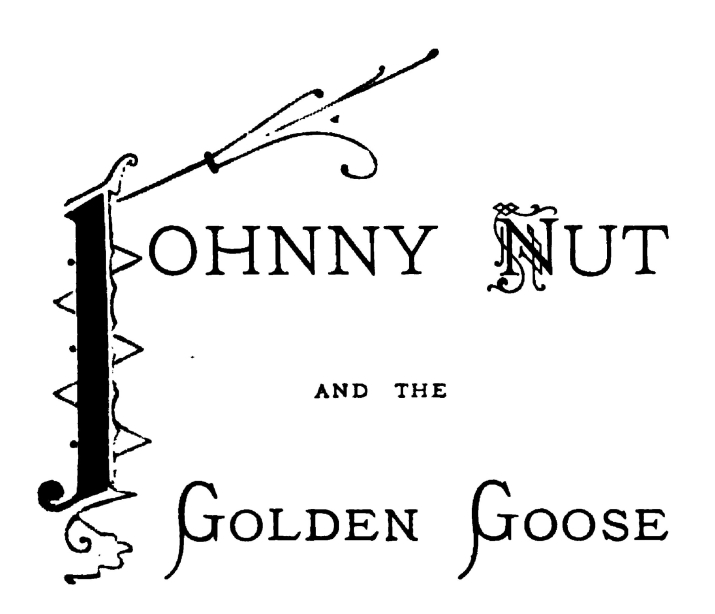
The Project Gutenberg EBook of Johnny Nut and the Golden Goose, by
Andrew Lang and Charles Deulin
This eBook is for the use of anyone anywhere in the United States and most
other parts of the world at no cost and with almost no restrictions
whatsoever. You may copy it, give it away or re-use it under the terms of
the Project Gutenberg License included with this eBook or online at
www.gutenberg.org. If you are not located in the United States, you'll have
to check the laws of the country where you are located before using this ebook.
Title: Johnny Nut and the Golden Goose
Author: Andrew Lang
Charles Deulin
Illustrator: A. M. Lynen
Release Date: November 22, 2014 [EBook #47428]
Last Updated: December 17, 2016
Language: English
Character set encoding: UTF-8
*** START OF THIS PROJECT GUTENBERG EBOOK JOHNNY NUT AND THE GOLDEN GOOSE ***
Produced by David Widger from page images generously
provided by the Internet Archive

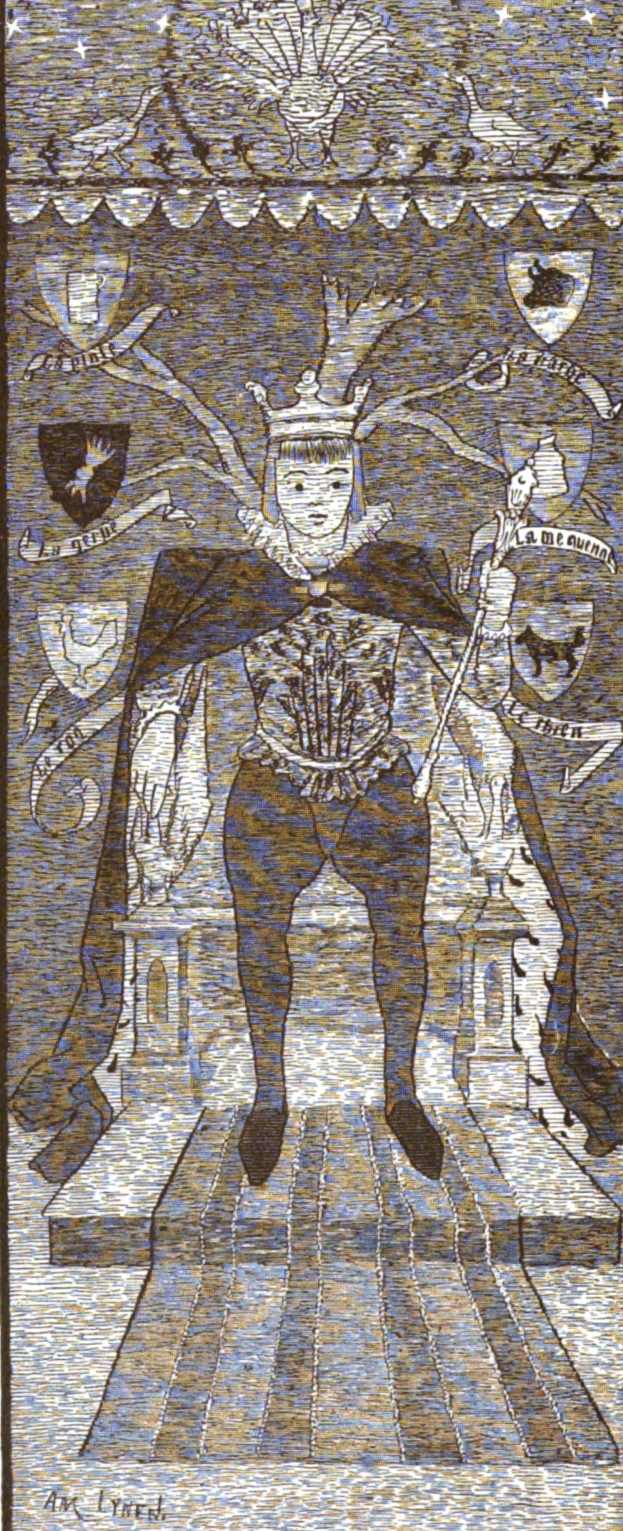
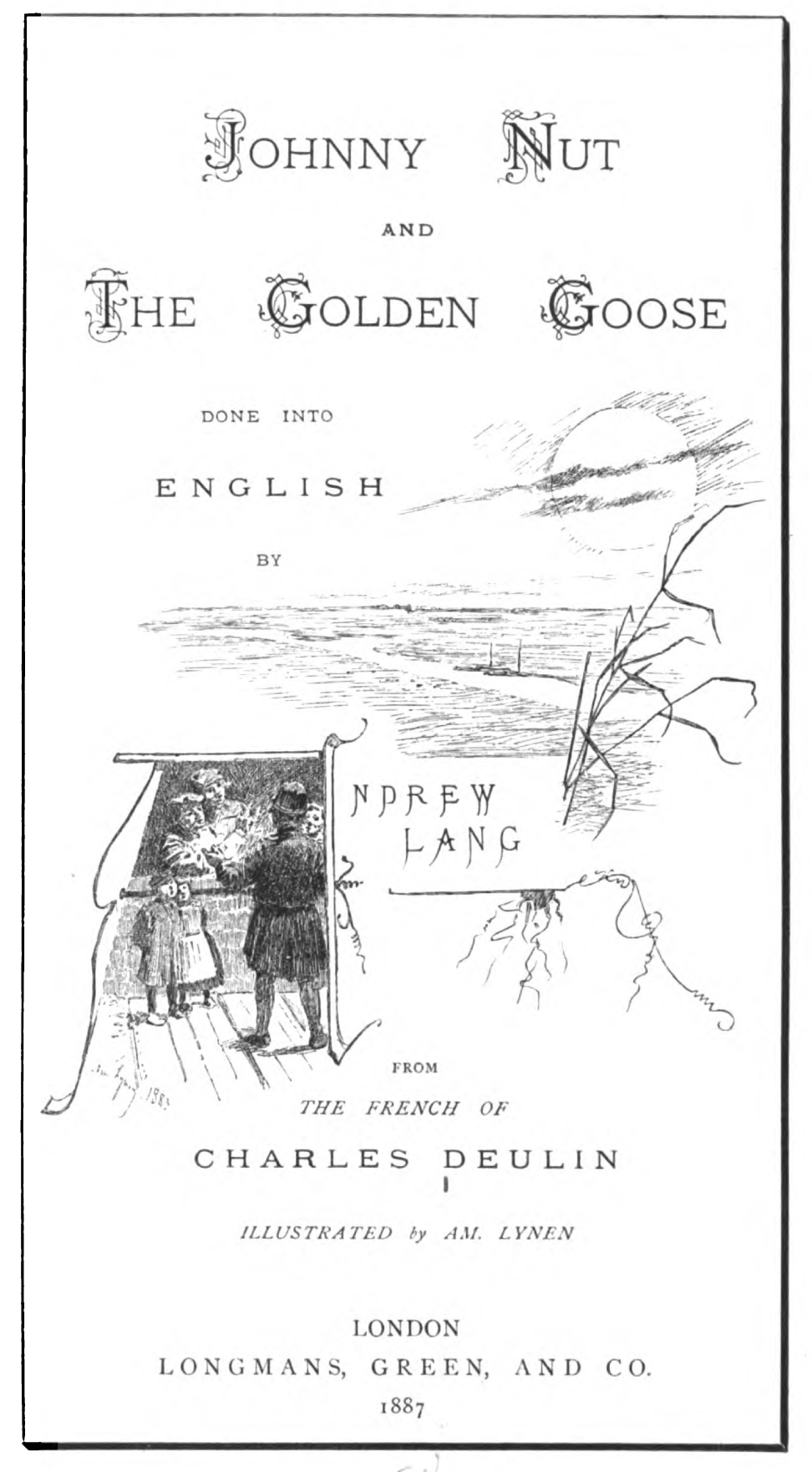
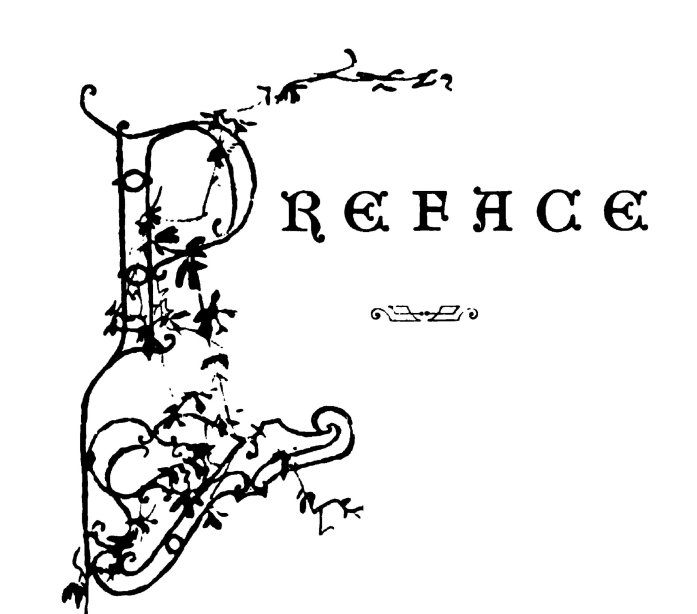
CONTENTS
This Tale is rendered, a little freely, from Trente-six Rencontres de Jean du Gogué, in Contes d’un Buveur de Bière, par Charles Deulin. (Sixième Edition. Paris: Dentu. 1873.)
The late M. Deulin told with much humour, and probably with but little alteration from oral tradition, the popular tales of his native province. The narrative here translated has points in common with a Tongan legend, with several ancient French fabliaux, with a Zulu story in Bishop Callaway’s collection, and with Grimm’s Golden Goose.
IKE the Sultan in the Arabian Nights—and, sure, you are no less despotic—you have sometimes commanded me to ‘tell you a story.‘It has been my privilege to obey; but, alas! when my toil was ended, with a stretch of absolute authority you have bidden me ‘tell you another.‘Truly, Madam, the Ocean of the Streams of Story, whereof the Hindoos speak, will speedily be drained dry by your Slave, who now presents you with this little Tale, which he has conveyed from French Flanders. If it amuses your leisure as much to read, as it has diverted mine to translate it, I shall have that enjoyment which attends successful enterprise, and I remain,
Madam,
Yours very humbly to command
LONG TIME AGO there lived in French Flanders, at a village called Saint Saulve, Valenciennes way, a little cow-boy named Johnny Nut He had no father and no mother, and they called him Johnny Nut because he was found one fine morning under a walnut-tree. Silly Billy was another name he had, for he was just as great an innocent as a calf before it is weaned.
Now, never in his living days had Johnny Nut dined on anything better than potatoes, and the one thing he wanted in the world was to taste roast goose.
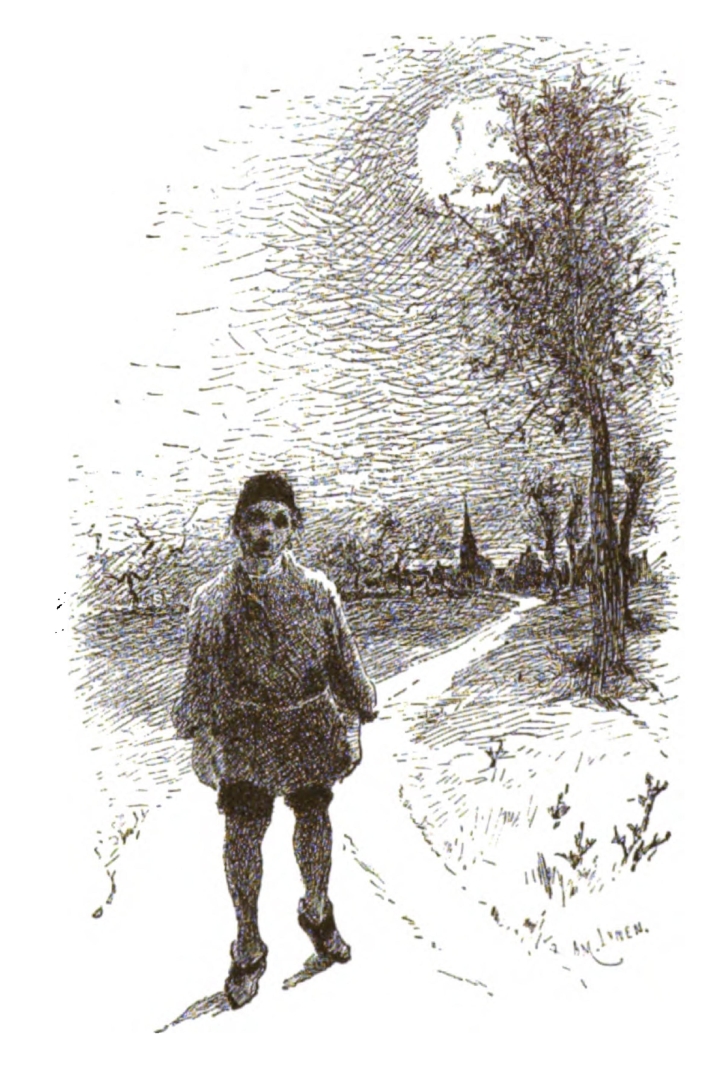
Now, about a dozen miles off, Condé way, there is a village where the geese are so grand that all the world talks of nothing but the Hergnies geese.
‘When I grow up,’ said Johnny, ‘I’ll go to Hergnies and eat goose.’
So, at long and at last, one autumn evening he left the cows in the lurch, and off he went, without beat of drum.
Now, whether he came back as poor as he started, and what a great love of roast goose brought Silly Billy to, that’s what we are going to tell you!
So Johnny Nut followed his nose, and asked his way, and at nightfall he reached the village of Escau-bridge.
‘You can’t show me the way to Hergnies, mother?’ cried Johnny to the farmer’s wife, who was just sitting down to supper.
‘That I can, my son, but you are out late.
‘Are you in such a hurry?’
‘Oh, mother, who is in a hurry if not me? These ten years I’ve been dying to taste roast goose, so don’t you see there’s no time to waste.’
The farmer’s wife stared at him with all her eyes.
‘What do they call you?’ says she.
‘Silly Billy,’ says he.
‘Oh, don’t I see.
‘Yes, I see,’ said the woman, laughing to his very face. ‘Listen, my lad! You are big, and strong, and you seem honest. Now Jim, our man, is off on the King’s wars. Will you take his place?’
‘Will you let me taste roast goose?’
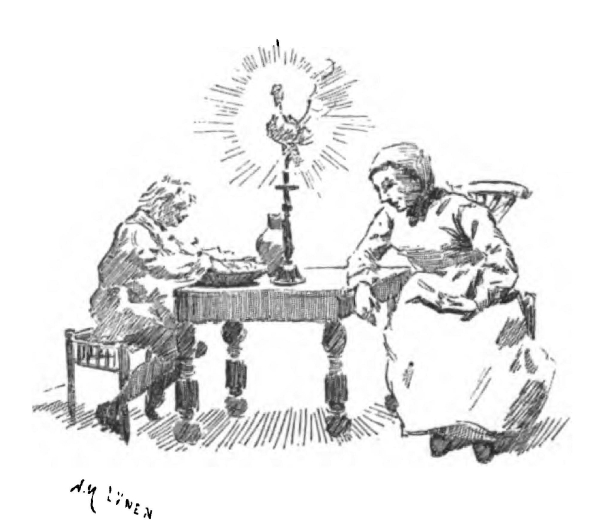
‘On Sunday, as sure as sure, you shall have your fill of goose; I have to send some one to Hergnies, to my cousin’s, to-morrow. You shall start, at peep of day, and bring me a good fat goose. We’ll dine off him when we come back from the fair at the next town. Does that suit you, my son?’
‘Mother, it’s just the thing for me.’
‘Then come to supper.’
And to supper went Johnny Nut, with such an appetite that he scarcely had time to say grace.
EXT day was a Saturday, and the farmer’s wife went to waken Johnny in the stable-loft.
‘Come, come, up with you!’ says she, shaking him. ‘Don’t you hear the cock crowing?’ So she gave him a big bowl of coffee, and such a chunk of bread; and showed him the way, and sent him off, saying, ‘Mind you ask for my cousin’s mill, and bring me the goose, and seven bushels of flour, and a pint of seed corn.’
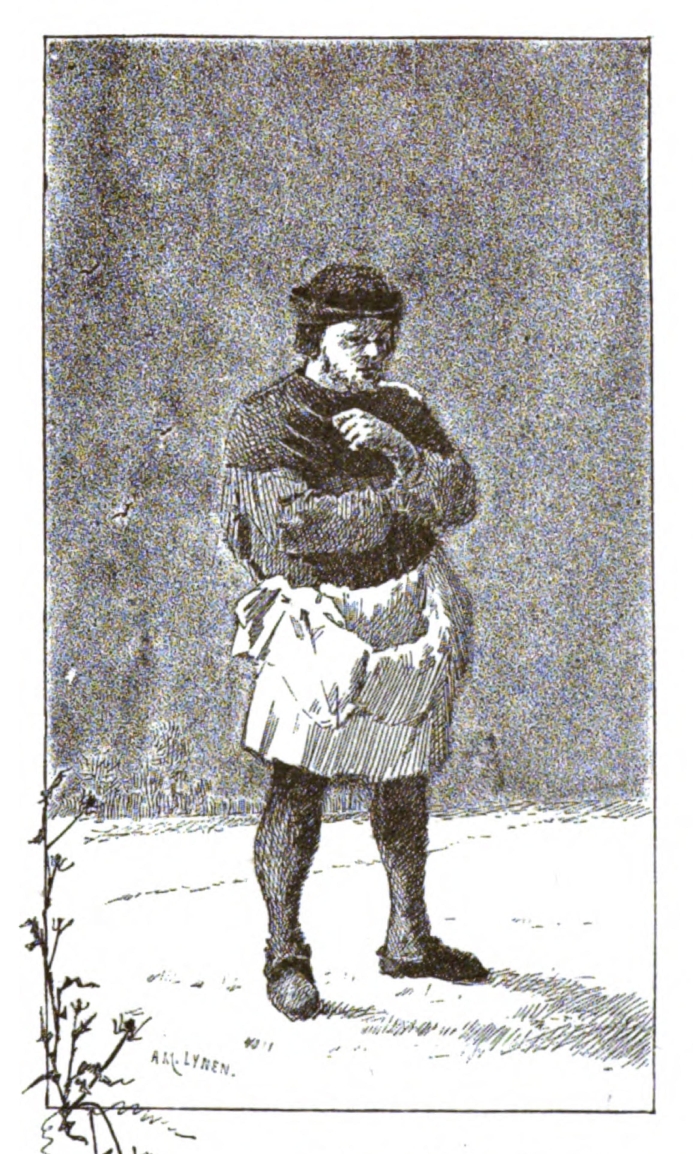
‘Seven bushels, and one pint,’ ‘Seven bushels, and one pint’—for, not being very clever, he was afraid he might forget.
As he went on saying this, he met a farmer, who was counting up how much his field should bring him in.
‘Seven bushels, indeed!’ said the farmer. ‘Let a hundred come!’
Now this puzzled Johnny Silly Billy, for he had never room in his head for more than one idea at a time; so he went on his way, repeating,
‘Let a hundred come! let a hundred come!’
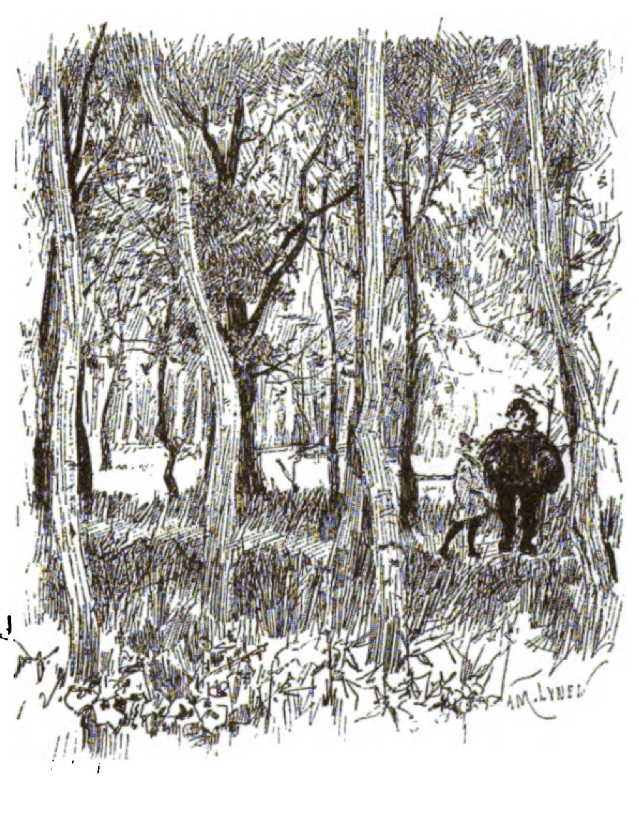
Well, as Johnny crossed a wood, there sat a shepherd, as red as scarlet, and as proud as a peacock that has laid an egg; and all because his dog had just killed a wolf that was after the lambs.
‘Let a hundred of them come! let a hundred of them come!’ sang out Johnny Nut.
‘What do you mean, you fool?’ says the shepherd, ‘with your Let a hundred them come! A hundred, indeed! Rather say, There’s another caught and done for!’
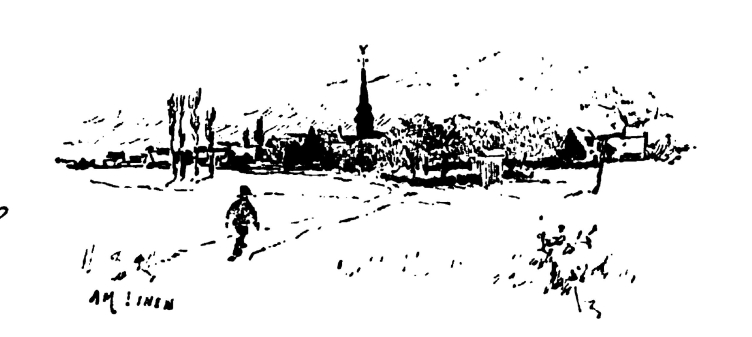
‘There’s another caught and done for!’said Johnny Nut, as he went on his way.
OW, as Johnny strutted along, he heard jolly music and wedding bells, and saw a multitude of people.
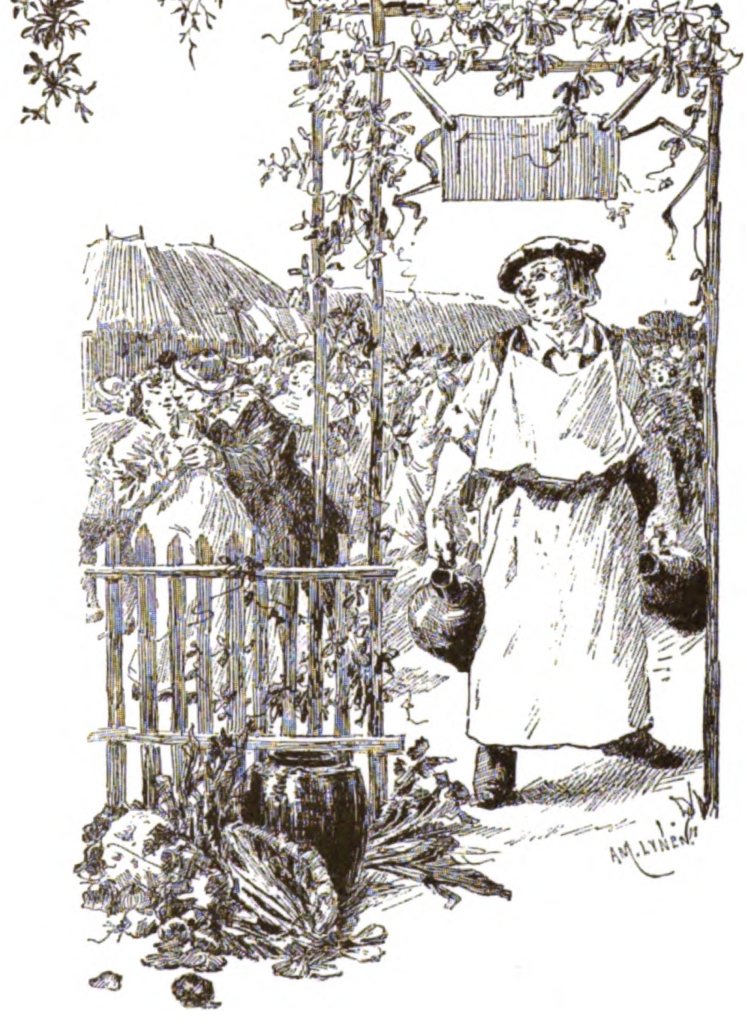
It was a wedding party, outside a tavern; and the fiddlers were fiddling, and everybody dancing.
Johnny Nut went through the middle of them all, shouting:—
‘There’s another caught and done for!’
‘Caught and done for! Meaning me!’ says the gay bridegroom; and he tucked up his shirtsleeves to give Johnny one in the eye. But the bridesmaid, who did not want a quarrel, gave Johnny a push, and said to him—
‘Idiot, say rather, “Let everybody follow a good example.”’
It was all one to Johnny, and off he went, shouting—
‘Let every one follow this good example!’
So he left the village, and he went, and went and better went, till he came to a house on fire.
The policeman had caught a poor tramp, whom he charged with burning the house.
‘Let everyone follow this good example!’ shouted Johnny, never thinking of anything but roast goose.
‘What’s that you say, you vagabond! You incite the populace to arson and fire-raising!’ cries the policeman, who was by way of being à great lawyer.
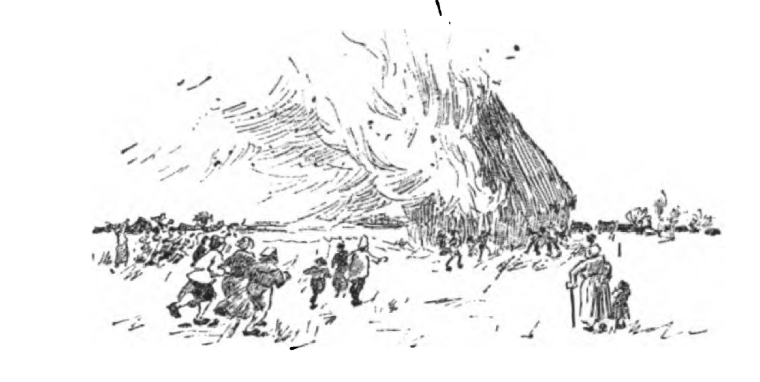
Johnny trembled like an aspen-leaf.
‘Say, “Heaven help you to put the fire out,”’ whispered one of the firemen; and Johnny said so, and off he went, the old way, crying—
‘Heaven help you to put the fire out!’
Now he passed a blacksmith’s forge, and that blacksmith was as cross as two sticks, for he had been blowing the bellows for three hours, and could not make the fire burn.
Well, just when a little tiny blue flame burst forth, as little as a pussycat’s tongue, what did the blacksmith hear but—
‘Heaven put the fire out!’
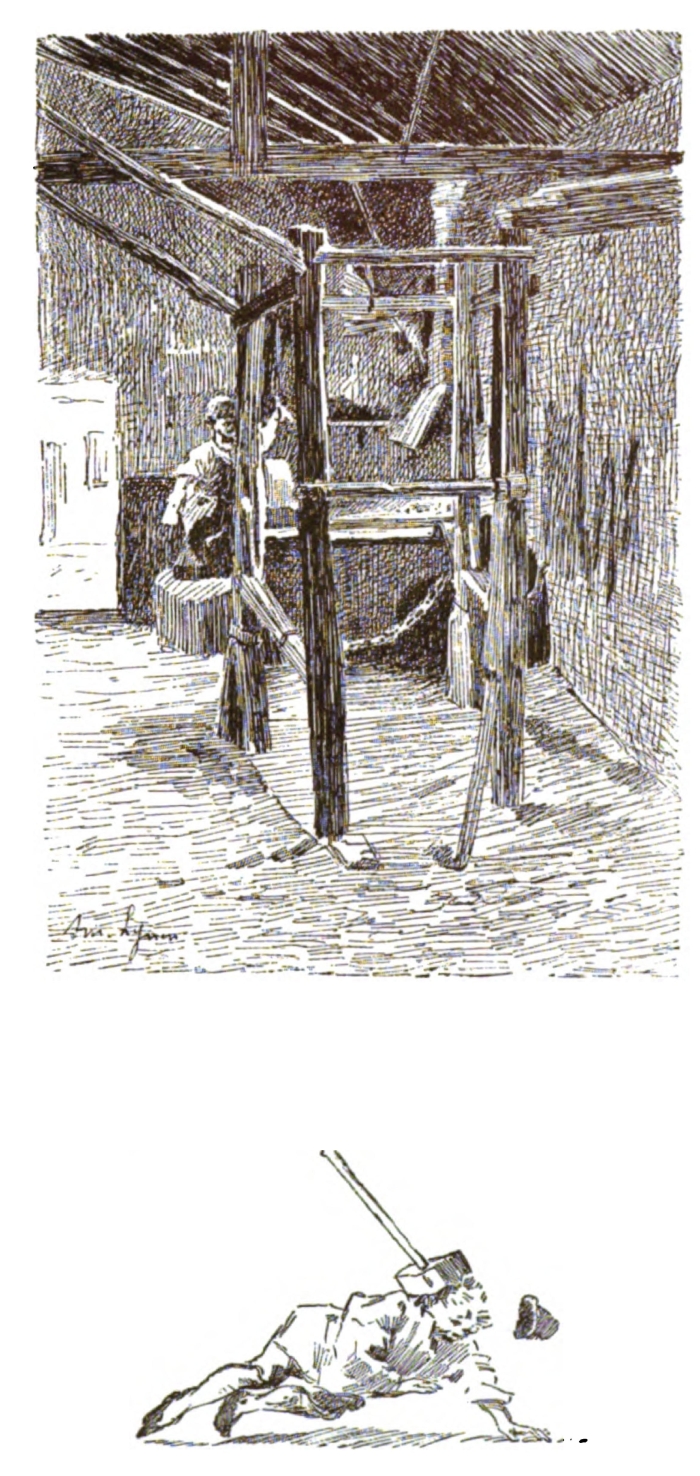
Round he turned, pitched his hammer at Johnny, and knocked him down flat on the king’s high way.
OHNNY was not dead; Fortune had other adventures in store for Johnny. A farmer came out with his men, and carried him into the house, where he soon came to his senses. It was not very much in that way he had to come to; but if Johnny had not many brains, he had an extraordinarily thick skull. The blow with the hammer would have killed another man, but it only made a bump on the head of our Johnny.
The farmer asked him where he came from and what he wanted.
‘I’m going to Hergnies, to eat roast goose,’ said Johnny.
‘Why, you are twelve miles from Hergnies,’ said the farmer; and he gave Johnny a sheaf of corn, and sent him on his road.
[Illustration: 8046]
Well, Johnny lost himself again, and sat down against a wall and lunched off part of his hunch of bread.
Then, as he was tired, he fell asleep, and a chicken came and ate all the grains of corn out of his sheaf. Then Johnny woke, and when he found he had nothing left of his sheaf but straw he fell a-crying.
Now, the farmer there was a good-natured man, and, to console Johnny, he made him a present of the fowl, and off he went.
About four in the afternoon Johnny was hungry again, and sat down to finish his hunch of bread with his chicken beside him.
Up came a clumsy great cow, and trod on the chicken and crushed it flat.
Johnny set off sobbing again. ‘Never no luck,’ says he. ‘They gave me a sheaf, and a chicken ate it. They gave me a chicken, and a cow crushed it Boo-hoo!’
‘Don’t boo-hoo,’ says the Lord of the Manor, who came by with his gun on his shoulder and his game-bag on his back. ‘Don’t boo-hoo! take the cow.’
‘Thank you kindly, your noble worship,’ says Johnny, as merry as may be, and he and the cow jogged along till it grew dark.
At last Johnny came to another farm, and there the farmer took in him and his cow.
Now, this farmer had a big pretty maid, as strong as a man, and he bade her milk Johnny’s cow. But, as she milked, the cow switched its tail in her eyes and made her see quite an illumination.
The maid was an angry maid. She picked up a pitchfork and threw it at the cow, and the poor beast fell down dead!
Then Johnny began to cry again, and I don’t wonder at it.
‘Never no luck,’ says he. ‘They gave me a sheaf, and a chicken ate it; they gave me a chicken, and a cow crushed it; they gave me a cow, and the maid killed it. Boo-hoo!’
‘Oh bother! take the maid and don’t blubber,’ said the farmer. He didn’t like to keep a girl in the house who threw pitchforks about when she lost her temper.
Johnny did not wait to be asked twice. He took the maid, tied her hands and feet, put her in a sack, heaved her on to his back, and away went Johnny.
‘When I do get to Hergnies,’ said he to himself, ‘I’ll marry the maid, and we’ll have roast goose at the wedding supper,’ for his intentions were strictly honourable.
But the further he went the more Johnny didn’t find the way; and at last, as the maid was pretty heavy, he set her down by a tavern door and went in and asked for a pot of beer.
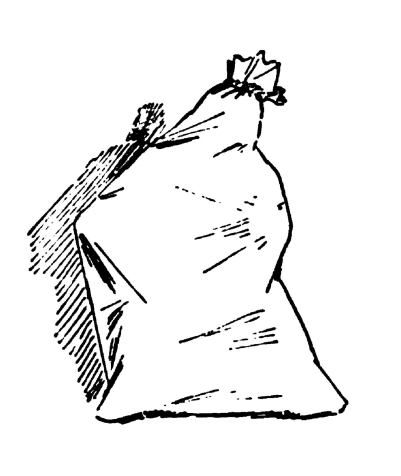
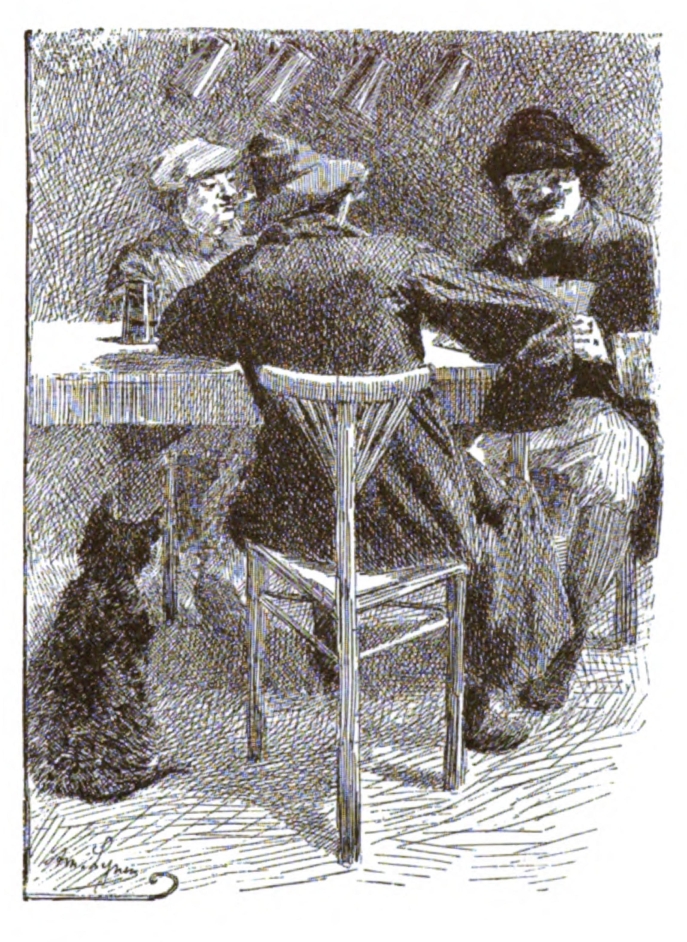
OW, in the tavern were Tuné, the tailor, with a coat he had made for a customer, and Nanasse, and Polydore, and Rumble his dog, four of the wildest wags in that country-side.
Tuné went out of the tavern to see what kind of night it was, and there was the sack and something in it that moved. So he opened the sack, and what should he find but a pretty tall maid, trussed like a fowl.
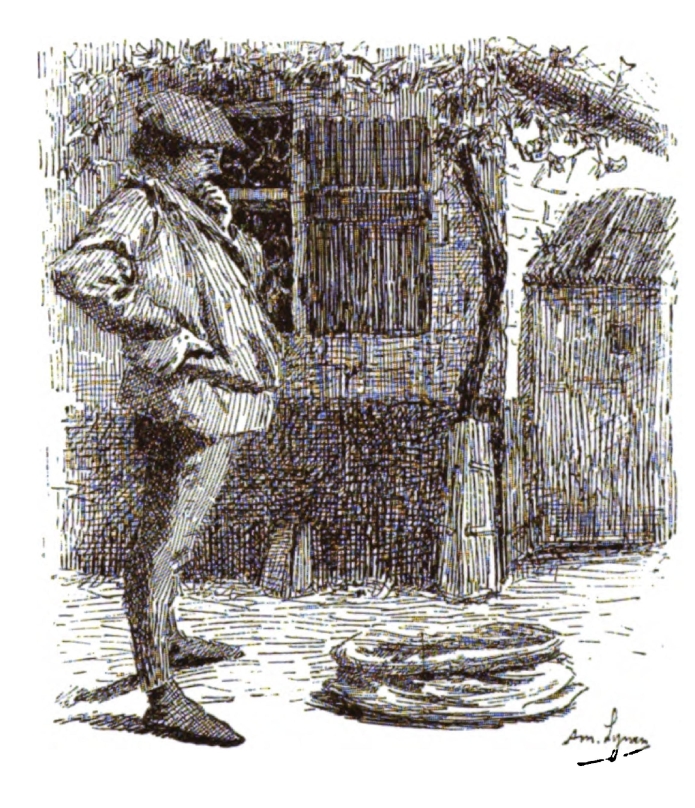
Well, he let her out and she told him all about it, and, as she was not dying to marry our Johnny, off she ran to her own village as hard as she could go.
‘What am I to fill the sack with?’ thought Tuné. ‘By George, I’ll put in Polydore’s yellow dog, Rumble.’
So he whistled to Rumble and put him in the sack.
By this time Johnny had finished his ale, and he came out, hoisted the sack on his shoulder, and marched away without asking questions. Tune followed at a little distance, and, as Rumble knew a friend was there, why, he entered into the fun and said never a bark.
At last Johnny reached Hergnies, and where should he go to but to the parson’s, of course, to get married! Then it occurred to him that he had never asked the maid if she would have him! He put down the sack and opened it.
‘I say, maid,’ quoth he, ‘shall us get married, us two?’
‘G-r-r-r-r-r-r!’ says the maid.
Johnny, in a fright, let go his hold of the cord, the sack fell open, out jumped Rumble, and flew at his throat.
Johnny sprang into a willow-tree and climbed up it, but, lo and behold! the tree was rotten, and down came tree and Johnny and all on the back of Rumble! Now, Rumble was expecting nothing of that sort, and, with one wild yowl, he flew away like the wind, and never stopped till the town gates of Condé were closed behind him!
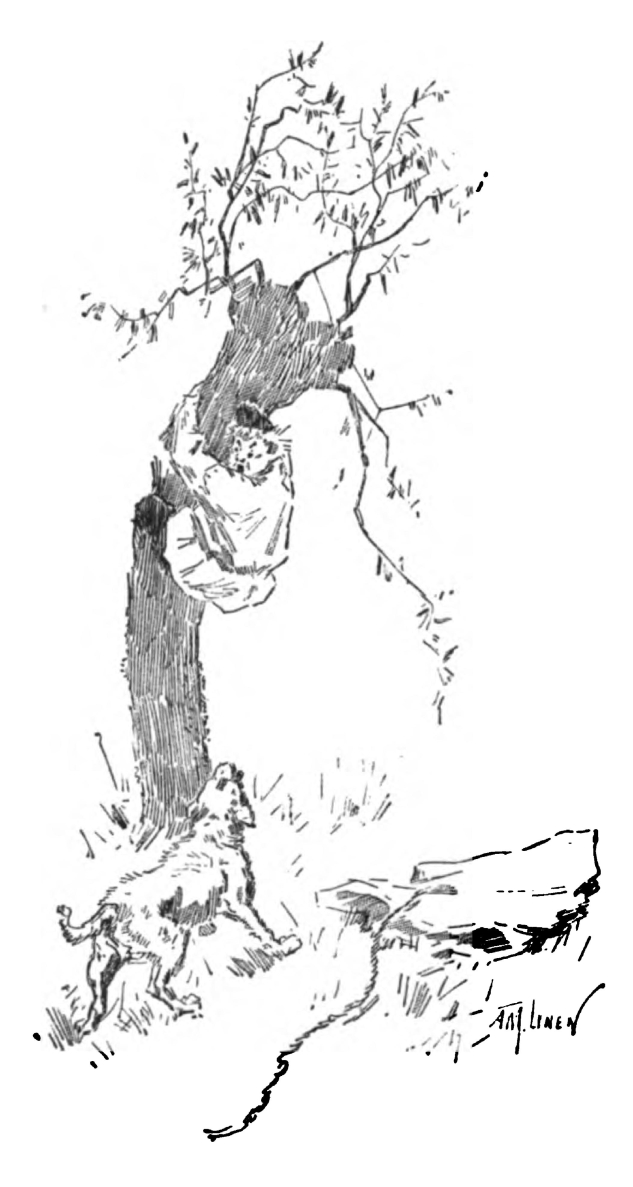
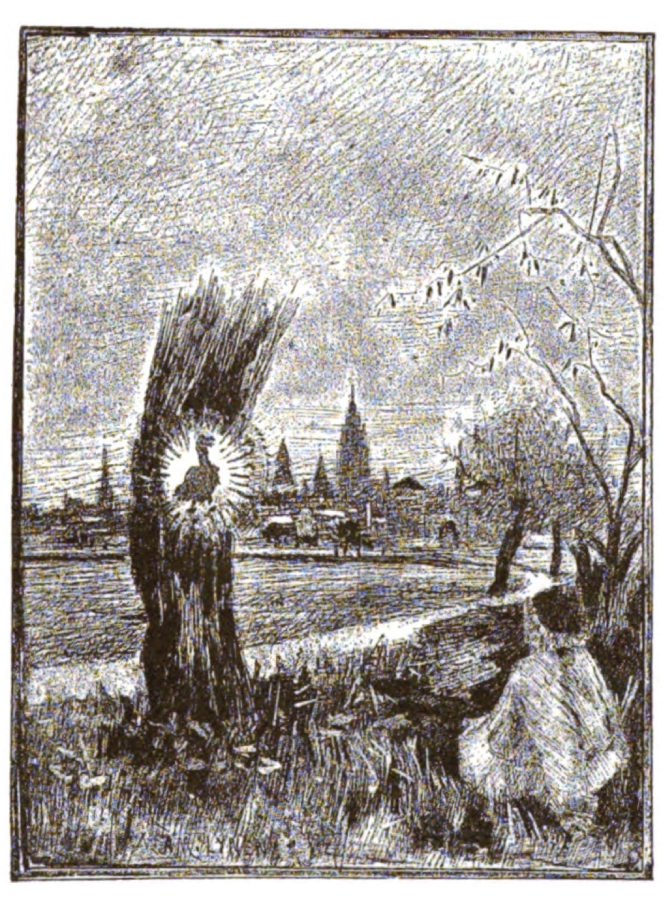
HEN once the voice of Rumble was lost in the distance, Johnny climbed out of the tree and found that none of his bones were broken.
All of a sudden in the hollow of the tree trunk he saw something shining like a will o’ the wisp.
He put in his hands and pulled out A Goose with Golden Feathers!
‘Here’s luck at last,’ says Johnny, ‘I’ve lost a maid and found a golden goose! I’ll have it roasted this very night,’ and off he went to the best inn in the village.
Now the inn was full of people going to the fair on St. Calixtus’s day, which was a great festival.
However, Johnny, being but a village idiot, had never heard anything about all that.
Up he comes and goes to the landlord, who didn’t know where to turn, he had so many customers, all going to the fair.
‘Cook my goose!’ says Johnny, as bold as brass.
‘Oh, you go to—Jerusalem,’ says the landlord, ‘we don’t cook gold geese here, not to-day, we don’t.’
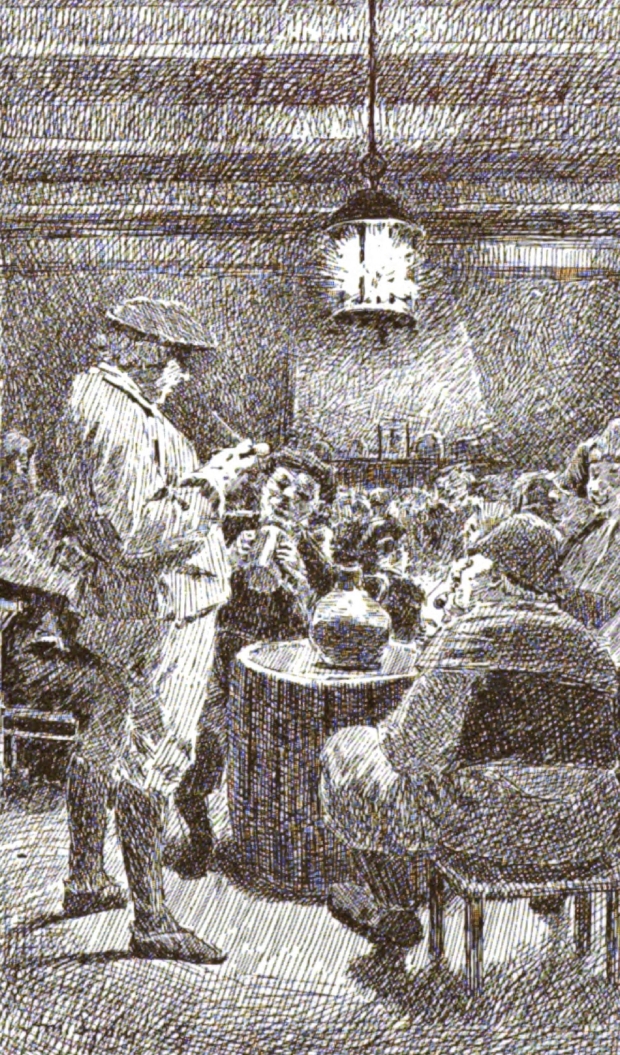
‘Well, if you won’t be obliging and cook my goose,’ says Johnny Nut, ‘why, I’ll give it to Saint Calixtus. A pretty poor saint he’ll be if he does not give me a goose fit to put on the spit in exchange for my goose of gold!’
So he got supper somehow, and went with his goose to sleep in the stable.
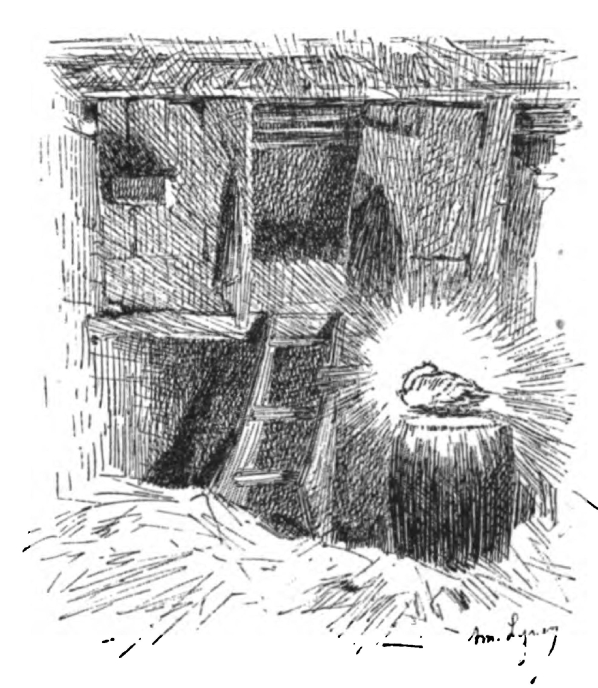
HE landlord of the inn had three fair daughters, all as curious as their mother Eve. All night long they turned and tossed in their beds, thinking about the golden goose and longing to see it.
As soon as the first cock crew, up gets the oldest daughter.
‘It is so hot I really can’t sleep,’ said she, and went on tip-toe to the stable, as quiet as pussy, for fear of waking Johnny.
In the moonlight the golden goose was shining like a star.
‘I’ll take one of the pretty feathers,’ said the girl, and put out her hand to touch it But she could not pluck the feather and she could not pull her hand away!
When the second cock crew, up got the second daughter.
‘It is far too hot to sleep,’ said she, and she ran downstairs to her sister. But as soon as she had touched her she could not move a step from the place!
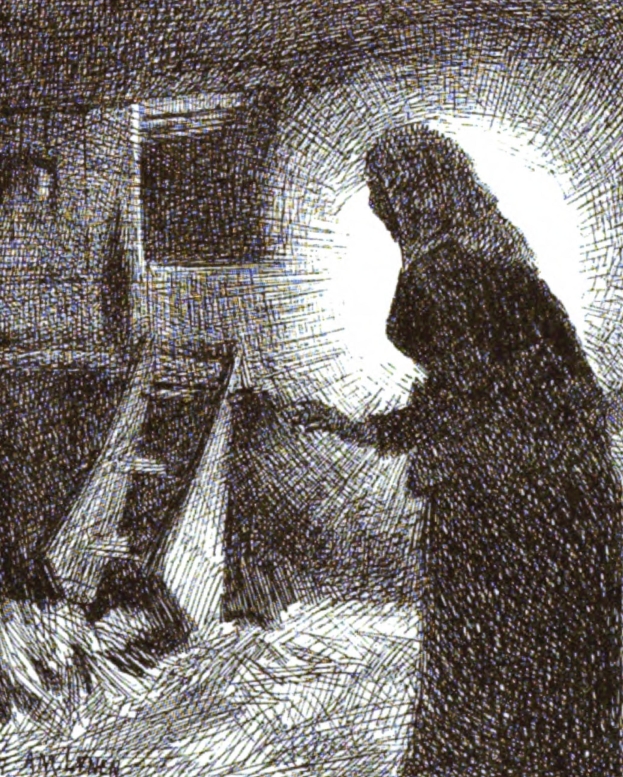
Then the third cock crew, and up got the youngest daughter, and ran to the stable after her sisters.
‘Take care! don’t come here!’ they cried, but she did not understand, and she thought—
‘Why, if they are there, I can go too!’
But as soon as she touched her sisters, there she was, as fast as could be to the golden goose!
A quarter of an hour later Johnny wakened, and stretched himself, and shook some of the straw out of his hair, and then took his goose under his arm, and off he went, never noticing the girls, whom he had not left behind him.
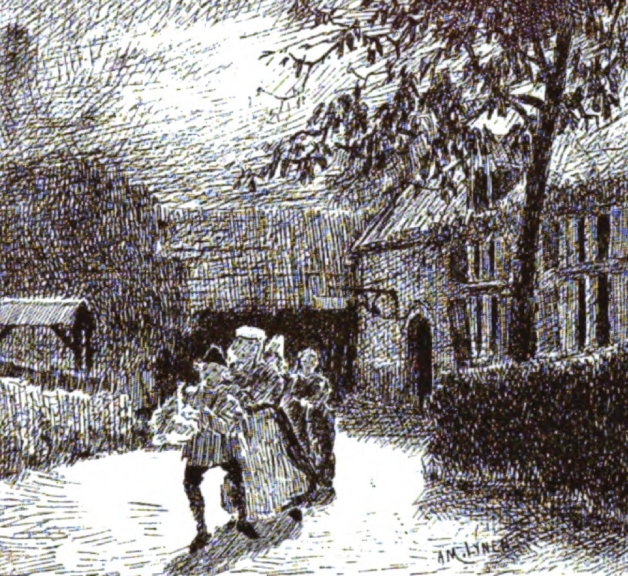
They tried to stop him, but Johnny thought they wanted to rob him of his goose, and he ran, and they ran, and they all ran as fast as their legs would carry them.
When they were out of the village, the girls were also out of breath, and they entreated Johnny to stop. So he said he would stop if they would show him the right road, and the sun was up by the time they reached the next village.
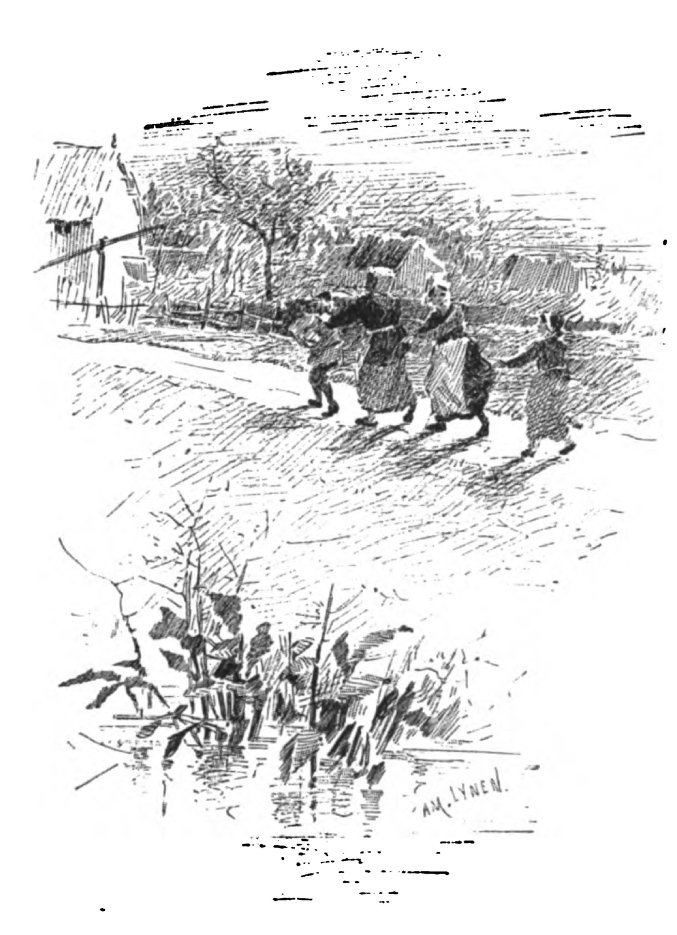
UST at that very moment, who should come by who should come by but the Vicar of Condé, with his two Curates, the Churchwardens, the Beadle himself, the man that played the fiddle, the man that played the cornet, and all the wicked little choirboys.
They were all marching off to sing the Mass on St. Calixtus’s day.
The Vicar at that time was a stout clergyman, as big as a barrel, but he was a very holy man, and very severe about good and modest behaviour.
Naturally, when he saw the landlord’s daughters all strutting away behind our Johnny, he was Shocked!
‘Are you not ashamed of yourselves,’ he cried out, ‘great lasses like you, to run about the country after a lad?’
So he plucked the youngest girl by the sleeve to stop her, but, behold! no sooner had he touched her than he could not leave hold, and he had to march after the golden goose!
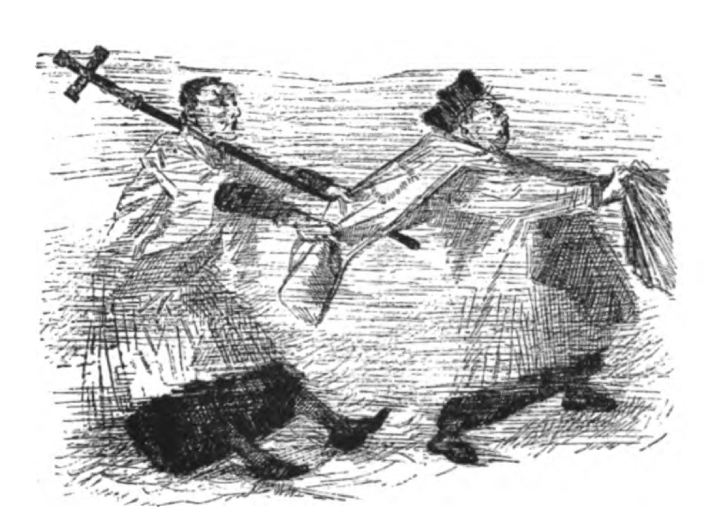
‘Oh, sir, oh, sir!’ cried the Beadle (who was a long, thin-legged man, like a heron), and he ran up, caught hold of the Vicar by his gown, and there he stuck.
The Vicar cried for help to the rest of his company, so first the Curates, then the Organist, then the man with the violin, then the cornet-player, and, lastly, all the wicked little choir-boys, rushed to hold the Vicar back, but they were all caught, and had all to run after Johnny, while Johnny just followed his goose!
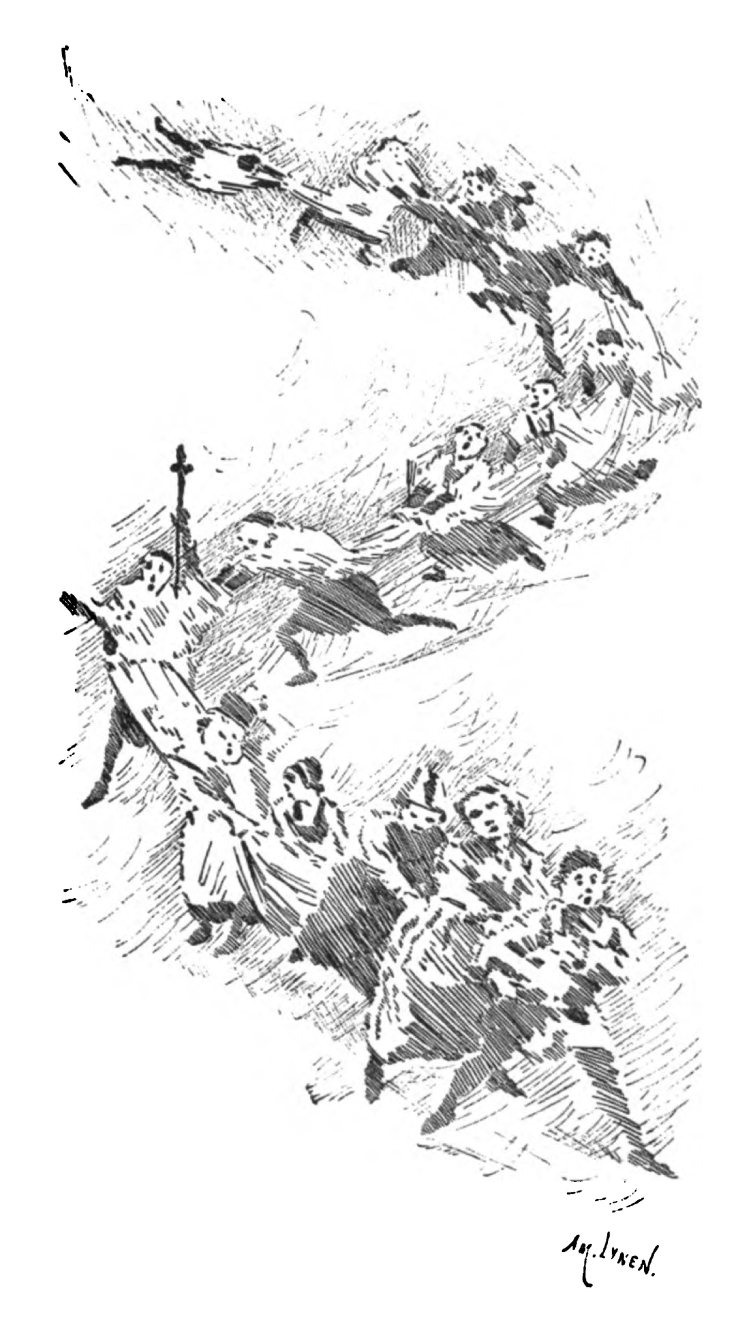
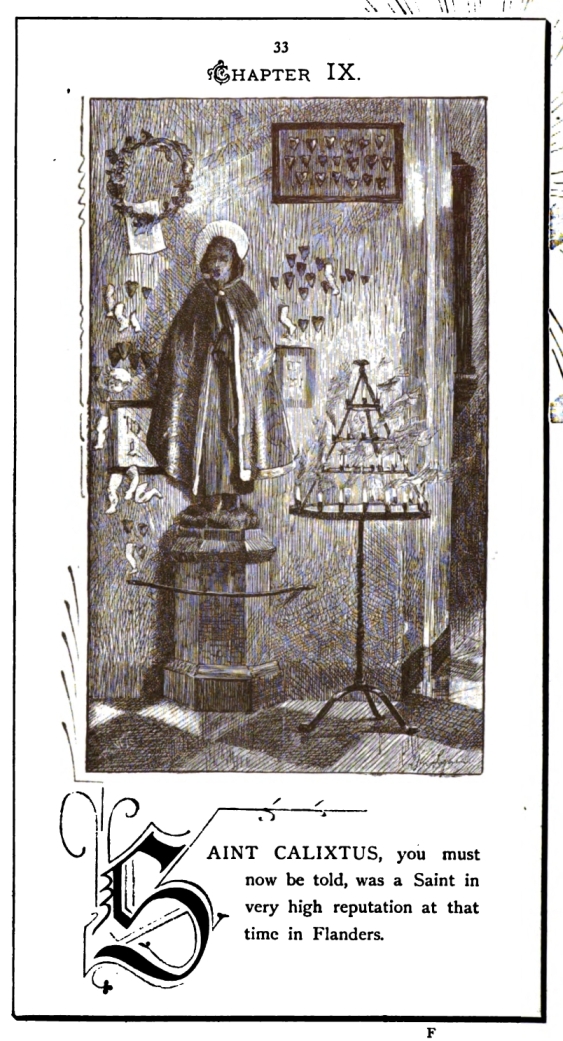
Pilgrims came to do him honour from all the country round, and, as Saint Calixtus was famous for curing lame people, they made a very singular procession.
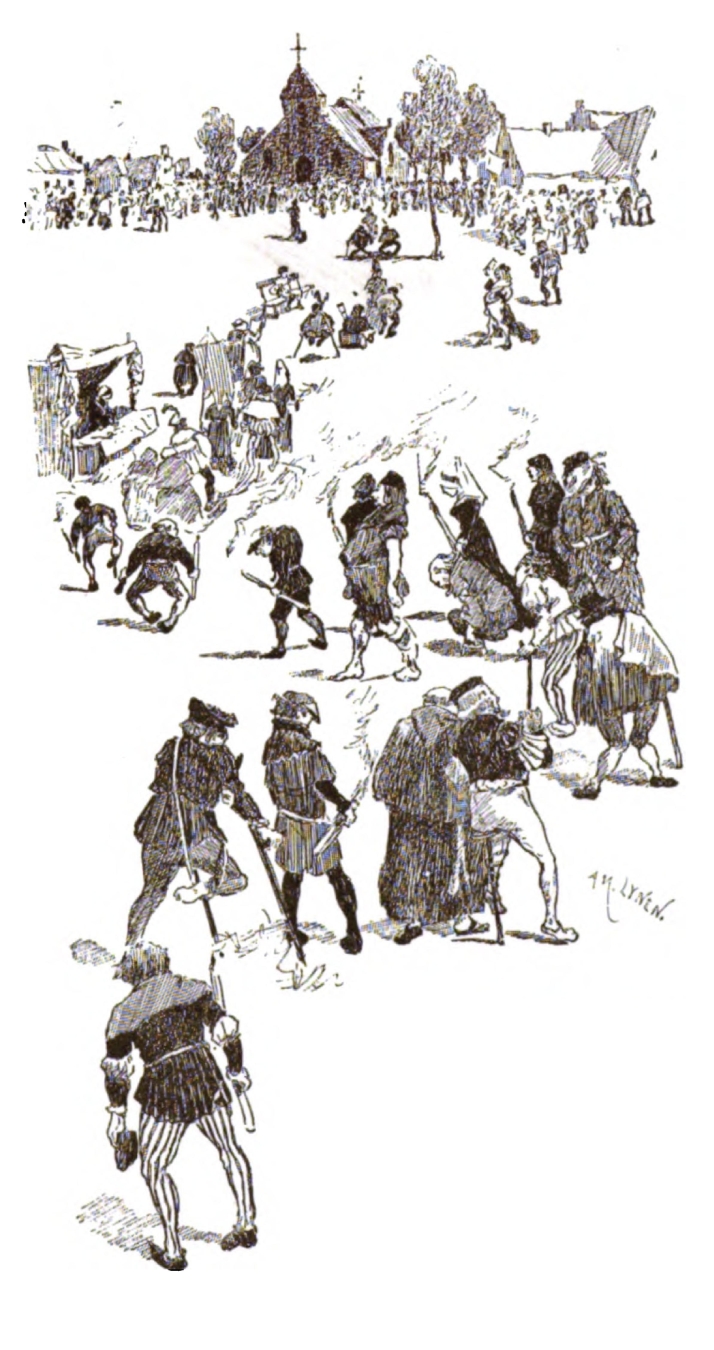
The maimed and the halt and the blind were there, humpbacks by the dozen, cripples by the score, men with wooden legs, men with iron hooks instead of hands, men with wry necks—in short, they were a funny spectacle.
They would not have been funny, but very pitiful, if they had really been lame and blind, but the truth is that they were all persons whom the good Saint had cured, and now they were only making believe, for one day in the year, to suffer from their old complaints. But, to tell the truth, they looked so odd that the images of the other Saints in the chapel were set, on that day, with their faces to the wall, for fear they should break out laughing.
When the High Mass had been sung, all the worthy cripples threw away their sham humps, and bandages, and wooden legs, and they laughed, and danced, and skipped, and revelled, so that it was a pleasure to see so many people enjoying themselves.
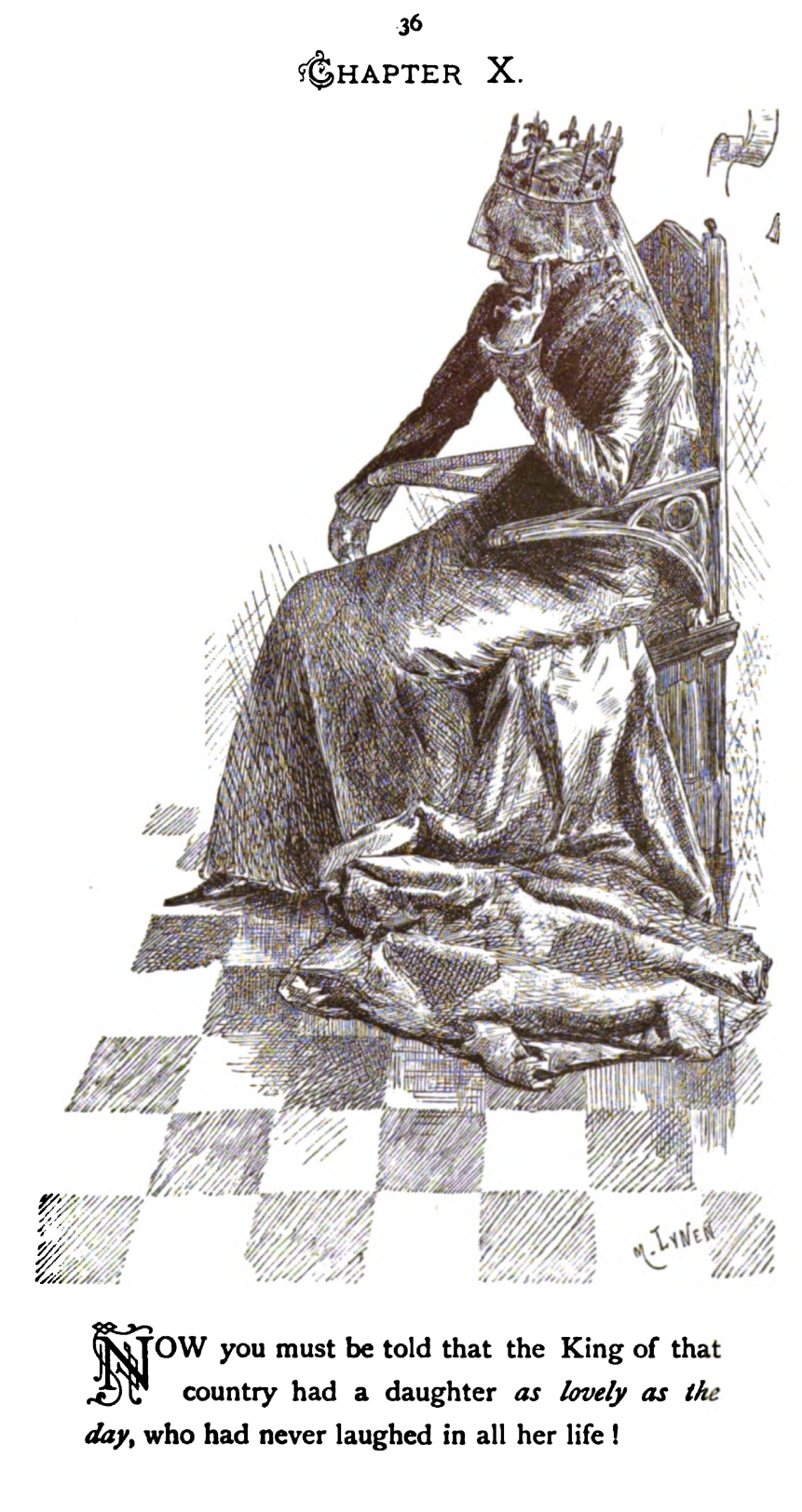
NOW you must be told that the King of that country had a daughter as lovely as the day, who had never laughed in all her life!
She was as sad and sorry as the mournful Bell that rings for a death, and so they called her the Passing Belle; it was a sort of joke. *
* The French country people call the Passing Bell La
Dolente, and this unhappy Princess they named La Belle
Dolente. If any child cannot understand this, she may
consult her nice French grammar, and her French and English
dictionary, and turn it over in her mind till next
Christmas.
Now, as she was an only child, the ‘Passing Belle had been spoiled from her very cradle. Cakes, toys, diversions, such as playing at funerals, had been lavished on her, but she never, never smiled.
They tried her with Punch and Judy, they tried her with pantomimes, they took her to the play, but there never came a smile on the pale lips of the Passing Belle.
She would not have laughed for a King’s ransom; nay, if you had ordered her off to instant execution, and laid her head on the block, you could not have wrung a smile from her!
The King, who had a strong sense of humour, was in despair. Finally he had a proclamation printed:—
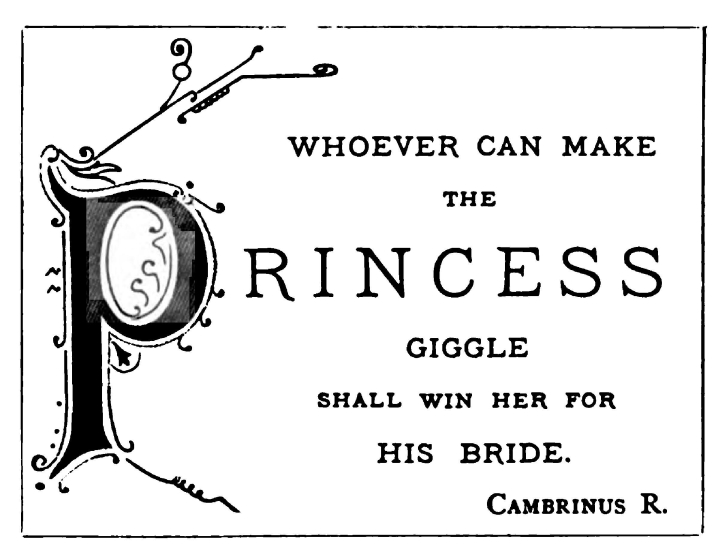
But nobody came!
Every one thought it was hopeless to get a laugh from the Passing Belle. Then the King, who was a very religious man, determined to take her to the shrine of Saint Calixtus. Of course, if the Saint could make her smile, she would become a nun, and perhaps, in the long run, would have been as solemn and lugubrious as ever.
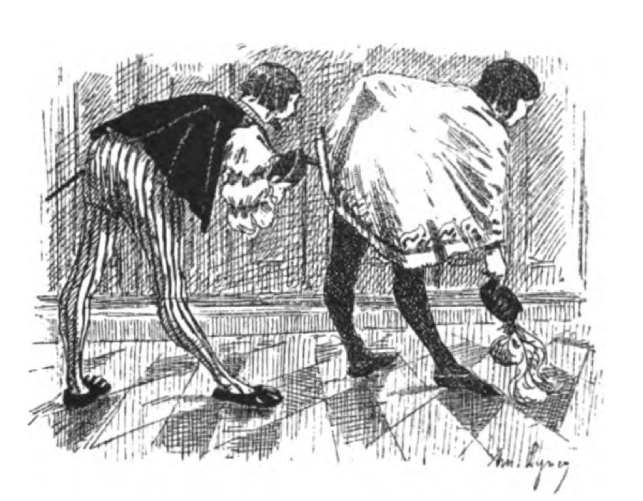
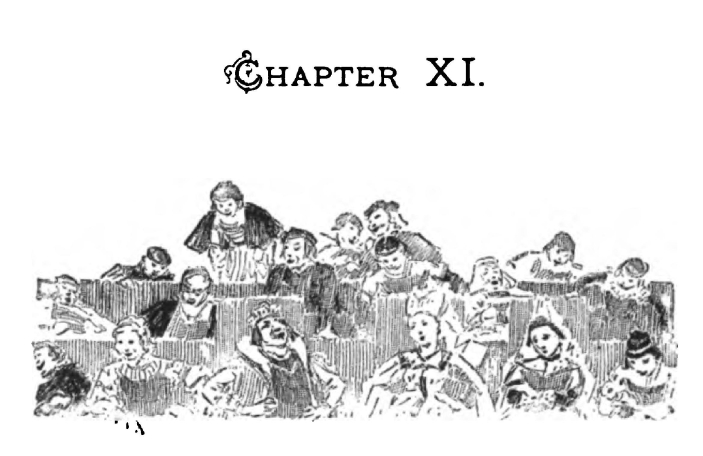
LL the Court came, and all the Court nearly died with laughing at the procession of the halt, and lame, and blind. ‘Go it, ye cripples,’ cried his Majesty, in convulsions of merriment! Some of the people were like X’s, and some like Y’s, and some like Z’s, and plenty of K’s and S’s, all the cross letters were there, all the letters but straight upright I. Meanwhile the courtiers held their sides and screamed, and the tears came into their eyes; but the Princess yawned like a pretty little trout out of water! She did not see what there was to laugh at!
Besides, if she had laughed, perhaps they would have made her marry a man with a hump upon his back, or two wooden legs and a glass eye.
The fun was over, the King got up, the courtiers all rose, when past came Johnny and the golden goose and all his company.
Now when the Princess beheld our Johnny, and the landlord’s three daughters, and the fat Vicar, and the thin Beadle, and the two Curates, and the Organist, the violin-player, the man with the comet, and all the wicked little choir-boys, all stuck fast together, and all treading on each other’s heels, she fell into such convulsions of laughter that she dropped into the Queen’s arms, and chuckled till she was nearly dead.
The King, wild with delight, threw his royal arms around the neck of our Johnny, shouting, ‘Take her, you dog; she is yours, my bonny boy!’ and all the courtiers, falling on each other’s breasts, cried
Hooray, hooray,
She’s laughed to-day!
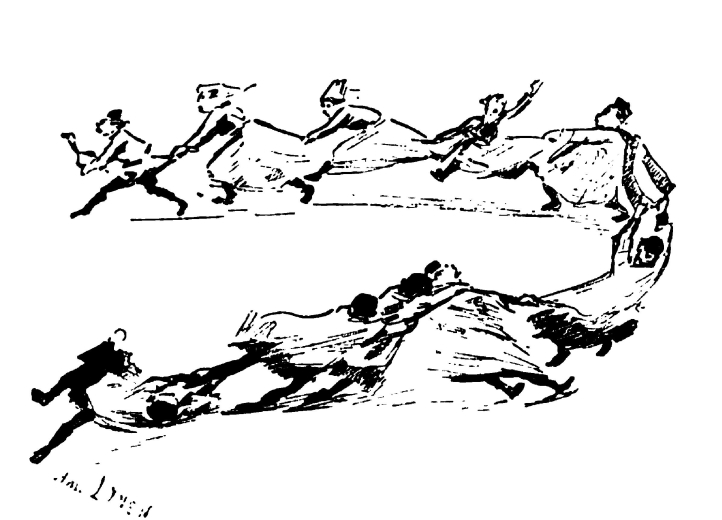
But our Johnny moved on, quite grave, to the altar of Saint Calixtus, and there he laid the golden goose, after which all the people who followed him were able to get free. The charm was broken.
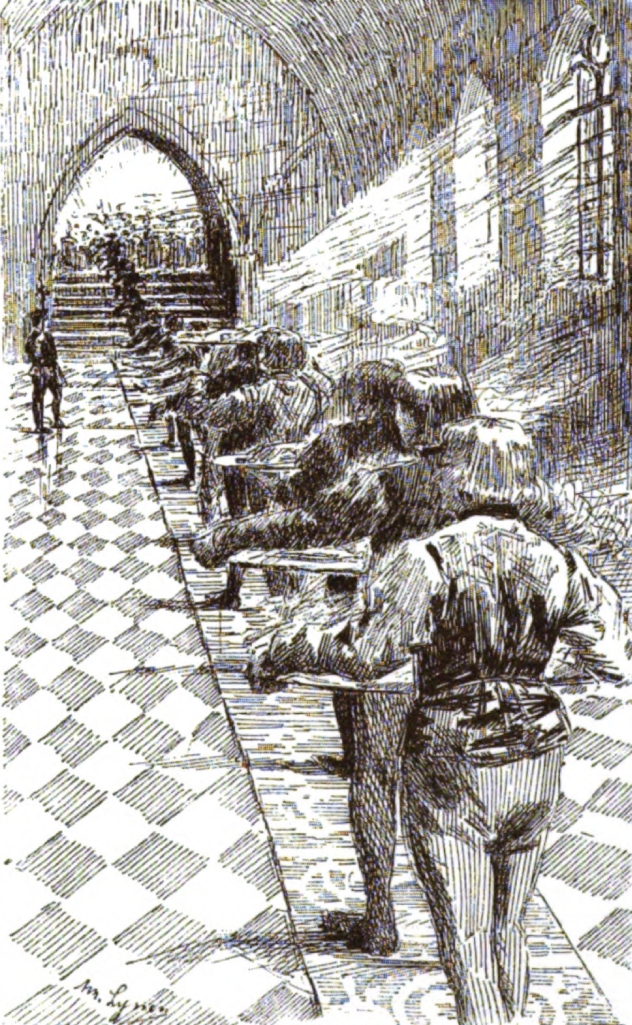
Next day was the marriage. They ate a whole flock of roast geese from Hergnies, and they drank two vats of the local beer. In short, merrier times never were, in all the merry country of Flanders, where the beer is so excellent.
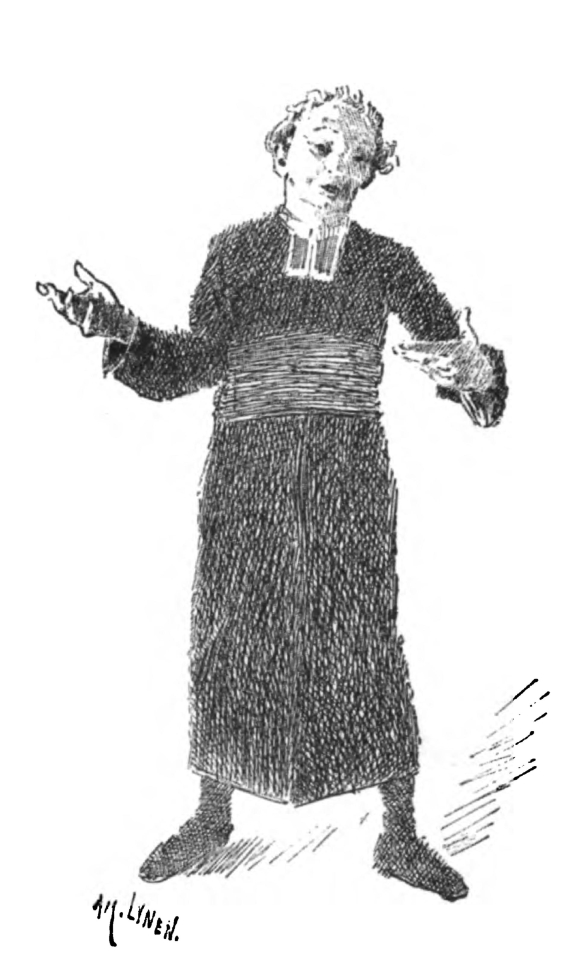
FTER the King died, Johnny succeeded to the vacant throne, and the Chronicles report that he did not govern less wisely than other monarchs, prime ministers, and politicians generally, before or since.
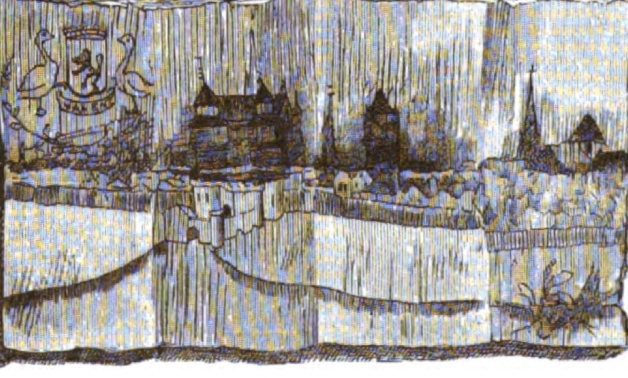
The people of his own good town of Valenciennes had a statue made of Johnny Nut, in walnut-wood, and a statue of his wife, and there they stand on a tower, and strike time on the big clock; so you see this story is quite true. Do not you believe any learned man who tells you that Johnny is the Sun, and that the Goose is the Sun, and that the Passing Belle is the Moon, or nonsense of that kind, which, my dear children, is too common!
I think the Moral is that we should always be kind to animals, respectful to Old Age, and, above all, that we should be Easily Amused.
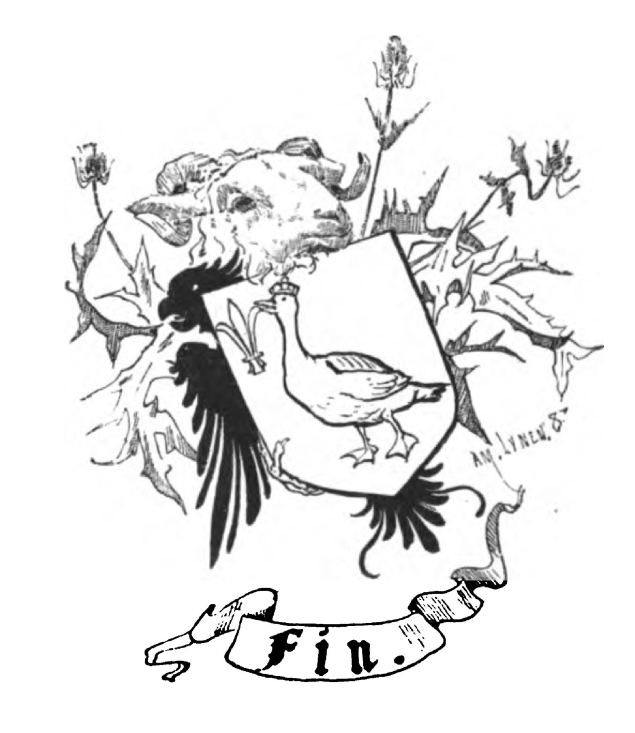
End of the Project Gutenberg EBook of Johnny Nut and the Golden Goose, by
Andrew Lang and Charles Deulin
*** END OF THIS PROJECT GUTENBERG EBOOK JOHNNY NUT AND THE GOLDEN GOOSE ***
***** This file should be named 47428-h.htm or 47428-h.zip *****
This and all associated files of various formats will be found in:
http://www.gutenberg.org/4/7/4/2/47428/
Produced by David Widger from page images generously
provided by the Internet Archive
Updated editions will replace the previous one--the old editions
will be renamed.
Creating the works from public domain print editions means that no
one owns a United States copyright in these works, so the Foundation
(and you!) can copy and distribute it in the United States without
permission and without paying copyright royalties. Special rules,
set forth in the General Terms of Use part of this license, apply to
copying and distributing Project Gutenberg-tm electronic works to
protect the PROJECT GUTENBERG-tm concept and trademark. Project
Gutenberg is a registered trademark, and may not be used if you
charge for the eBooks, unless you receive specific permission. If you
do not charge anything for copies of this eBook, complying with the
rules is very easy. You may use this eBook for nearly any purpose
such as creation of derivative works, reports, performances and
research. They may be modified and printed and given away--you may do
practically ANYTHING with public domain eBooks. Redistribution is
subject to the trademark license, especially commercial
redistribution.
*** START: FULL LICENSE ***
THE FULL PROJECT GUTENBERG LICENSE
PLEASE READ THIS BEFORE YOU DISTRIBUTE OR USE THIS WORK
To protect the Project Gutenberg-tm mission of promoting the free
distribution of electronic works, by using or distributing this work
(or any other work associated in any way with the phrase “Project
Gutenberg”), you agree to comply with all the terms of the Full Project
Gutenberg-tm License available with this file or online at
www.gutenberg.org/license.
Section 1. General Terms of Use and Redistributing Project Gutenberg-tm
electronic works
1.A. By reading or using any part of this Project Gutenberg-tm
electronic work, you indicate that you have read, understand, agree to
and accept all the terms of this license and intellectual property
(trademark/copyright) agreement. If you do not agree to abide by all
the terms of this agreement, you must cease using and return or destroy
all copies of Project Gutenberg-tm electronic works in your possession.
If you paid a fee for obtaining a copy of or access to a Project
Gutenberg-tm electronic work and you do not agree to be bound by the
terms of this agreement, you may obtain a refund from the person or
entity to whom you paid the fee as set forth in paragraph 1.E.8.
1.B. “Project Gutenberg” is a registered trademark. It may only be
used on or associated in any way with an electronic work by people who
agree to be bound by the terms of this agreement. There are a few
things that you can do with most Project Gutenberg-tm electronic works
even without complying with the full terms of this agreement. See
paragraph 1.C below. There are a lot of things you can do with Project
Gutenberg-tm electronic works if you follow the terms of this agreement
and help preserve free future access to Project Gutenberg-tm electronic
works. See paragraph 1.E below.
1.C. The Project Gutenberg Literary Archive Foundation (“the Foundation”
or PGLAF), owns a compilation copyright in the collection of Project
Gutenberg-tm electronic works. Nearly all the individual works in the
collection are in the public domain in the United States. If an
individual work is in the public domain in the United States and you are
located in the United States, we do not claim a right to prevent you from
copying, distributing, performing, displaying or creating derivative
works based on the work as long as all references to Project Gutenberg
are removed. Of course, we hope that you will support the Project
Gutenberg-tm mission of promoting free access to electronic works by
freely sharing Project Gutenberg-tm works in compliance with the terms of
this agreement for keeping the Project Gutenberg-tm name associated with
the work. You can easily comply with the terms of this agreement by
keeping this work in the same format with its attached full Project
Gutenberg-tm License when you share it without charge with others.
1.D. The copyright laws of the place where you are located also govern
what you can do with this work. Copyright laws in most countries are in
a constant state of change. If you are outside the United States, check
the laws of your country in addition to the terms of this agreement
before downloading, copying, displaying, performing, distributing or
creating derivative works based on this work or any other Project
Gutenberg-tm work. The Foundation makes no representations concerning
the copyright status of any work in any country outside the United
States.
1.E. Unless you have removed all references to Project Gutenberg:
1.E.1. The following sentence, with active links to, or other immediate
access to, the full Project Gutenberg-tm License must appear prominently
whenever any copy of a Project Gutenberg-tm work (any work on which the
phrase “Project Gutenberg” appears, or with which the phrase “Project
Gutenberg” is associated) is accessed, displayed, performed, viewed,
copied or distributed:
This eBook is for the use of anyone anywhere at no cost and with
almost no restrictions whatsoever. You may copy it, give it away or
re-use it under the terms of the Project Gutenberg License included
with this eBook or online at www.gutenberg.org
1.E.2. If an individual Project Gutenberg-tm electronic work is derived
from the public domain (does not contain a notice indicating that it is
posted with permission of the copyright holder), the work can be copied
and distributed to anyone in the United States without paying any fees
or charges. If you are redistributing or providing access to a work
with the phrase “Project Gutenberg” associated with or appearing on the
work, you must comply either with the requirements of paragraphs 1.E.1
through 1.E.7 or obtain permission for the use of the work and the
Project Gutenberg-tm trademark as set forth in paragraphs 1.E.8 or
1.E.9.
1.E.3. If an individual Project Gutenberg-tm electronic work is posted
with the permission of the copyright holder, your use and distribution
must comply with both paragraphs 1.E.1 through 1.E.7 and any additional
terms imposed by the copyright holder. Additional terms will be linked
to the Project Gutenberg-tm License for all works posted with the
permission of the copyright holder found at the beginning of this work.
1.E.4. Do not unlink or detach or remove the full Project Gutenberg-tm
License terms from this work, or any files containing a part of this
work or any other work associated with Project Gutenberg-tm.
1.E.5. Do not copy, display, perform, distribute or redistribute this
electronic work, or any part of this electronic work, without
prominently displaying the sentence set forth in paragraph 1.E.1 with
active links or immediate access to the full terms of the Project
Gutenberg-tm License.
1.E.6. You may convert to and distribute this work in any binary,
compressed, marked up, nonproprietary or proprietary form, including any
word processing or hypertext form. However, if you provide access to or
distribute copies of a Project Gutenberg-tm work in a format other than
“Plain Vanilla ASCII” or other format used in the official version
posted on the official Project Gutenberg-tm web site (www.gutenberg.org),
you must, at no additional cost, fee or expense to the user, provide a
copy, a means of exporting a copy, or a means of obtaining a copy upon
request, of the work in its original “Plain Vanilla ASCII” or other
form. Any alternate format must include the full Project Gutenberg-tm
License as specified in paragraph 1.E.1.
1.E.7. Do not charge a fee for access to, viewing, displaying,
performing, copying or distributing any Project Gutenberg-tm works
unless you comply with paragraph 1.E.8 or 1.E.9.
1.E.8. You may charge a reasonable fee for copies of or providing
access to or distributing Project Gutenberg-tm electronic works provided
that
- You pay a royalty fee of 20% of the gross profits you derive from
the use of Project Gutenberg-tm works calculated using the method
you already use to calculate your applicable taxes. The fee is
owed to the owner of the Project Gutenberg-tm trademark, but he
has agreed to donate royalties under this paragraph to the
Project Gutenberg Literary Archive Foundation. Royalty payments
must be paid within 60 days following each date on which you
prepare (or are legally required to prepare) your periodic tax
returns. Royalty payments should be clearly marked as such and
sent to the Project Gutenberg Literary Archive Foundation at the
address specified in Section 4, “Information about donations to
the Project Gutenberg Literary Archive Foundation.”
- You provide a full refund of any money paid by a user who notifies
you in writing (or by e-mail) within 30 days of receipt that s/he
does not agree to the terms of the full Project Gutenberg-tm
License. You must require such a user to return or
destroy all copies of the works possessed in a physical medium
and discontinue all use of and all access to other copies of
Project Gutenberg-tm works.
- You provide, in accordance with paragraph 1.F.3, a full refund of any
money paid for a work or a replacement copy, if a defect in the
electronic work is discovered and reported to you within 90 days
of receipt of the work.
- You comply with all other terms of this agreement for free
distribution of Project Gutenberg-tm works.
1.E.9. If you wish to charge a fee or distribute a Project Gutenberg-tm
electronic work or group of works on different terms than are set
forth in this agreement, you must obtain permission in writing from
both the Project Gutenberg Literary Archive Foundation and Michael
Hart, the owner of the Project Gutenberg-tm trademark. Contact the
Foundation as set forth in Section 3 below.
1.F.
1.F.1. Project Gutenberg volunteers and employees expend considerable
effort to identify, do copyright research on, transcribe and proofread
public domain works in creating the Project Gutenberg-tm
collection. Despite these efforts, Project Gutenberg-tm electronic
works, and the medium on which they may be stored, may contain
“Defects,” such as, but not limited to, incomplete, inaccurate or
corrupt data, transcription errors, a copyright or other intellectual
property infringement, a defective or damaged disk or other medium, a
computer virus, or computer codes that damage or cannot be read by
your equipment.
1.F.2. LIMITED WARRANTY, DISCLAIMER OF DAMAGES - Except for the “Right
of Replacement or Refund” described in paragraph 1.F.3, the Project
Gutenberg Literary Archive Foundation, the owner of the Project
Gutenberg-tm trademark, and any other party distributing a Project
Gutenberg-tm electronic work under this agreement, disclaim all
liability to you for damages, costs and expenses, including legal
fees. YOU AGREE THAT YOU HAVE NO REMEDIES FOR NEGLIGENCE, STRICT
LIABILITY, BREACH OF WARRANTY OR BREACH OF CONTRACT EXCEPT THOSE
PROVIDED IN PARAGRAPH 1.F.3. YOU AGREE THAT THE FOUNDATION, THE
TRADEMARK OWNER, AND ANY DISTRIBUTOR UNDER THIS AGREEMENT WILL NOT BE
LIABLE TO YOU FOR ACTUAL, DIRECT, INDIRECT, CONSEQUENTIAL, PUNITIVE OR
INCIDENTAL DAMAGES EVEN IF YOU GIVE NOTICE OF THE POSSIBILITY OF SUCH
DAMAGE.
1.F.3. LIMITED RIGHT OF REPLACEMENT OR REFUND - If you discover a
defect in this electronic work within 90 days of receiving it, you can
receive a refund of the money (if any) you paid for it by sending a
written explanation to the person you received the work from. If you
received the work on a physical medium, you must return the medium with
your written explanation. The person or entity that provided you with
the defective work may elect to provide a replacement copy in lieu of a
refund. If you received the work electronically, the person or entity
providing it to you may choose to give you a second opportunity to
receive the work electronically in lieu of a refund. If the second copy
is also defective, you may demand a refund in writing without further
opportunities to fix the problem.
1.F.4. Except for the limited right of replacement or refund set forth
in paragraph 1.F.3, this work is provided to you ‘AS-IS’, WITH NO OTHER
WARRANTIES OF ANY KIND, EXPRESS OR IMPLIED, INCLUDING BUT NOT LIMITED TO
WARRANTIES OF MERCHANTABILITY OR FITNESS FOR ANY PURPOSE.
1.F.5. Some states do not allow disclaimers of certain implied
warranties or the exclusion or limitation of certain types of damages.
If any disclaimer or limitation set forth in this agreement violates the
law of the state applicable to this agreement, the agreement shall be
interpreted to make the maximum disclaimer or limitation permitted by
the applicable state law. The invalidity or unenforceability of any
provision of this agreement shall not void the remaining provisions.
1.F.6. INDEMNITY - You agree to indemnify and hold the Foundation, the
trademark owner, any agent or employee of the Foundation, anyone
providing copies of Project Gutenberg-tm electronic works in accordance
with this agreement, and any volunteers associated with the production,
promotion and distribution of Project Gutenberg-tm electronic works,
harmless from all liability, costs and expenses, including legal fees,
that arise directly or indirectly from any of the following which you do
or cause to occur: (a) distribution of this or any Project Gutenberg-tm
work, (b) alteration, modification, or additions or deletions to any
Project Gutenberg-tm work, and (c) any Defect you cause.
Section 2. Information about the Mission of Project Gutenberg-tm
Project Gutenberg-tm is synonymous with the free distribution of
electronic works in formats readable by the widest variety of computers
including obsolete, old, middle-aged and new computers. It exists
because of the efforts of hundreds of volunteers and donations from
people in all walks of life.
Volunteers and financial support to provide volunteers with the
assistance they need are critical to reaching Project Gutenberg-tm’s
goals and ensuring that the Project Gutenberg-tm collection will
remain freely available for generations to come. In 2001, the Project
Gutenberg Literary Archive Foundation was created to provide a secure
and permanent future for Project Gutenberg-tm and future generations.
To learn more about the Project Gutenberg Literary Archive Foundation
and how your efforts and donations can help, see Sections 3 and 4
and the Foundation information page at www.gutenberg.org
Section 3. Information about the Project Gutenberg Literary Archive
Foundation
The Project Gutenberg Literary Archive Foundation is a non profit
501(c)(3) educational corporation organized under the laws of the
state of Mississippi and granted tax exempt status by the Internal
Revenue Service. The Foundation’s EIN or federal tax identification
number is 64-6221541. Contributions to the Project Gutenberg
Literary Archive Foundation are tax deductible to the full extent
permitted by U.S. federal laws and your state’s laws.
The Foundation’s principal office is located at 4557 Melan Dr. S.
Fairbanks, AK, 99712., but its volunteers and employees are scattered
throughout numerous locations. Its business office is located at 809
North 1500 West, Salt Lake City, UT 84116, (801) 596-1887. Email
contact links and up to date contact information can be found at the
Foundation’s web site and official page at www.gutenberg.org/contact
For additional contact information:
Dr. Gregory B. Newby
Chief Executive and Director
gbnewby@pglaf.org
Section 4. Information about Donations to the Project Gutenberg
Literary Archive Foundation
Project Gutenberg-tm depends upon and cannot survive without wide
spread public support and donations to carry out its mission of
increasing the number of public domain and licensed works that can be
freely distributed in machine readable form accessible by the widest
array of equipment including outdated equipment. Many small donations
($1 to $5,000) are particularly important to maintaining tax exempt
status with the IRS.
The Foundation is committed to complying with the laws regulating
charities and charitable donations in all 50 states of the United
States. Compliance requirements are not uniform and it takes a
considerable effort, much paperwork and many fees to meet and keep up
with these requirements. We do not solicit donations in locations
where we have not received written confirmation of compliance. To
SEND DONATIONS or determine the status of compliance for any
particular state visit www.gutenberg.org/donate
While we cannot and do not solicit contributions from states where we
have not met the solicitation requirements, we know of no prohibition
against accepting unsolicited donations from donors in such states who
approach us with offers to donate.
International donations are gratefully accepted, but we cannot make
any statements concerning tax treatment of donations received from
outside the United States. U.S. laws alone swamp our small staff.
Please check the Project Gutenberg Web pages for current donation
methods and addresses. Donations are accepted in a number of other
ways including checks, online payments and credit card donations.
To donate, please visit: www.gutenberg.org/donate
Section 5. General Information About Project Gutenberg-tm electronic
works.
Professor Michael S. Hart was the originator of the Project Gutenberg-tm
concept of a library of electronic works that could be freely shared
with anyone. For forty years, he produced and distributed Project
Gutenberg-tm eBooks with only a loose network of volunteer support.
Project Gutenberg-tm eBooks are often created from several printed
editions, all of which are confirmed as Public Domain in the U.S.
unless a copyright notice is included. Thus, we do not necessarily
keep eBooks in compliance with any particular paper edition.
Most people start at our Web site which has the main PG search facility:
www.gutenberg.org
This Web site includes information about Project Gutenberg-tm,
including how to make donations to the Project Gutenberg Literary
Archive Foundation, how to help produce our new eBooks, and how to
subscribe to our email newsletter to hear about new eBooks.